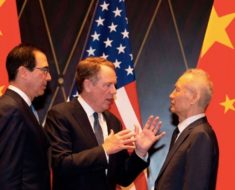The policy of the United States regarding currency for the last few decades has been to basically take a hands-off approach. Past administrations made it a point not to get involved with currency affairs and asked other governments to do the same. It was also generally considered a good thing if the dollar was healthy in the process.
Current United States President Donald Trump is showing signs that he may be set to take a different approach. The president has already communicated his belief that a strong dollar is not necessarily a good thing and his cabinet has considered whether currency manipulation is a useful tool in the current trade war with China.
Traders and investors have many questions regarding the president’s position. First and foremost is how and under what circumstances would President Trump choose to intervene in currency affairs. There are also questions regarding what effect the president’s intervention would have on currency markets and if other countries would follow the president’s lead.
The president used Twitter to lash out recently in response to plans announced by the European Central Bank to buy bonds and cut rates in an attempt to stimulate a sluggish economy. The announcement caused a spike in the value of the dollar which ended 9.8 percent above the low demonstrated in 2018 when compared to six other major currencies.
Consumers in America benefit from a strong dollar by the increased ability to afford imported goods. However, manufacturers and exporters suffer due to the increased cost of exports for foreign customers. According to Market Watch, this is a difficult situation for companies that are dependent on foreign profits to stay afloat.
Fred Bergsten works for the Peterson Institute for International Economics as a senior fellow. Bergsten agrees with the president and says the exchange rate of the dollar must be weakened before there can be any progress seen with the trade deficit experienced by the United States.
Mr. Bergsten goes on to explain the president may have a difficult time finding international support for any plan that would weaken the U.S. dollar. It is also unclear if the Fed would back the president on such a move.
Analysts on Wall Street are not expecting an imminent intervention on the part of the president in currency affairs. However, Morgan Stanley reasons that the longer the Fed does not give the president the interest rate cuts he wants, the more likely the chances are that the president will intervene in currency affairs in the future.
Dil Bole Oberoi





